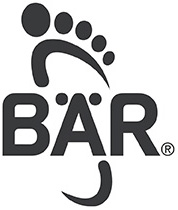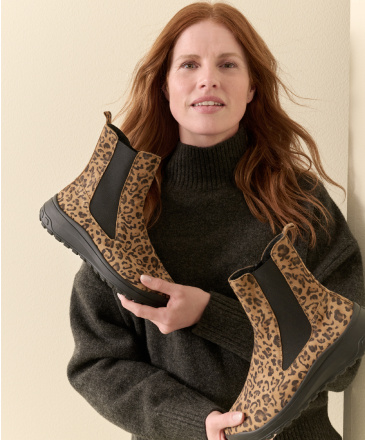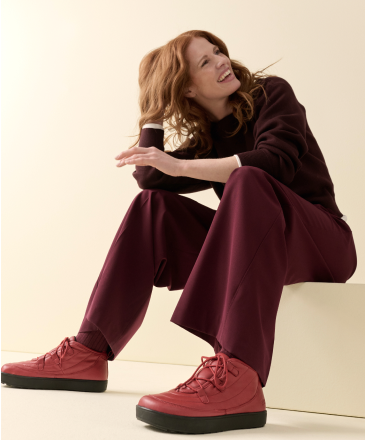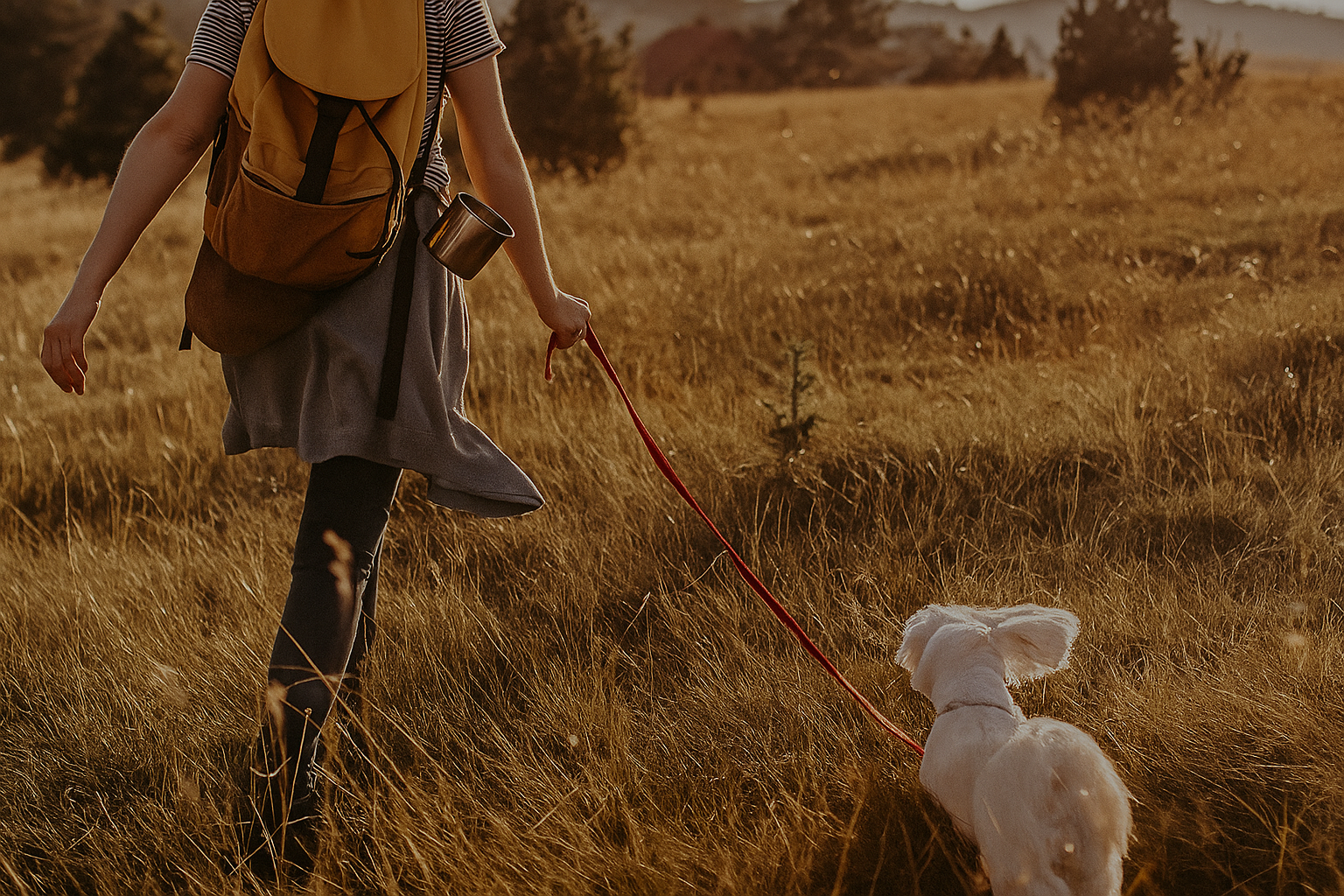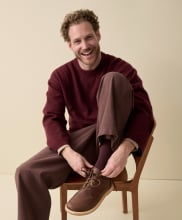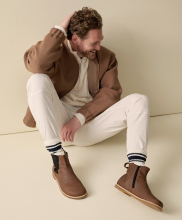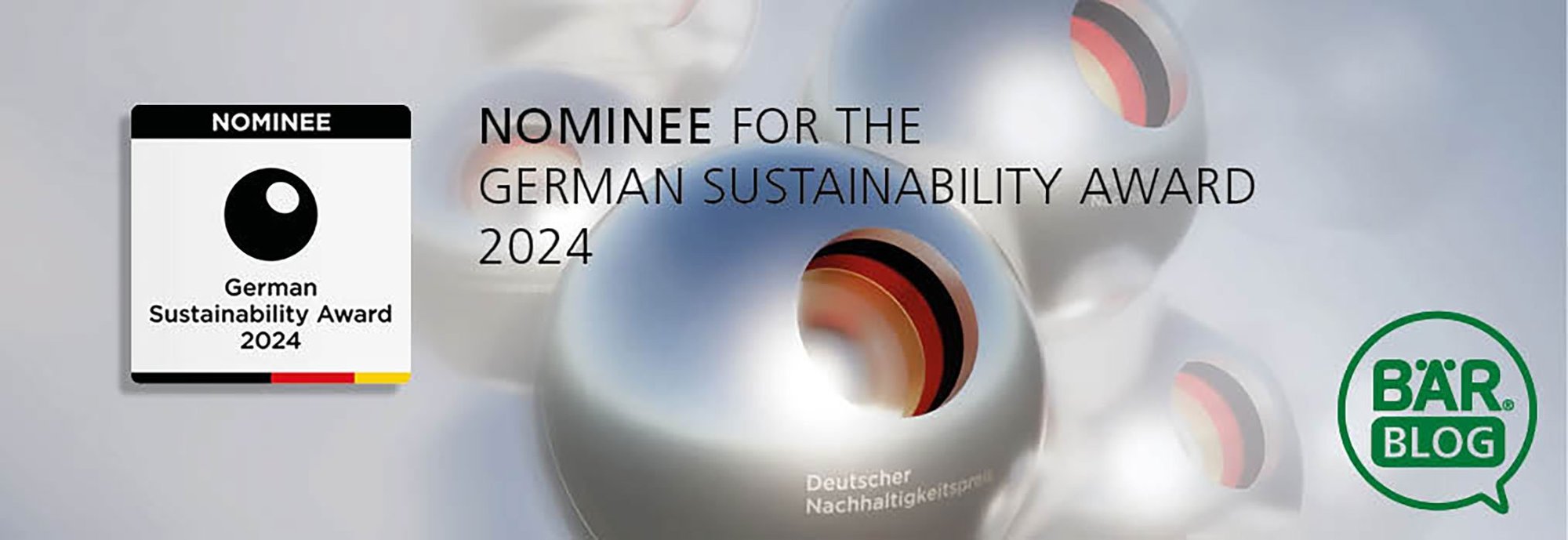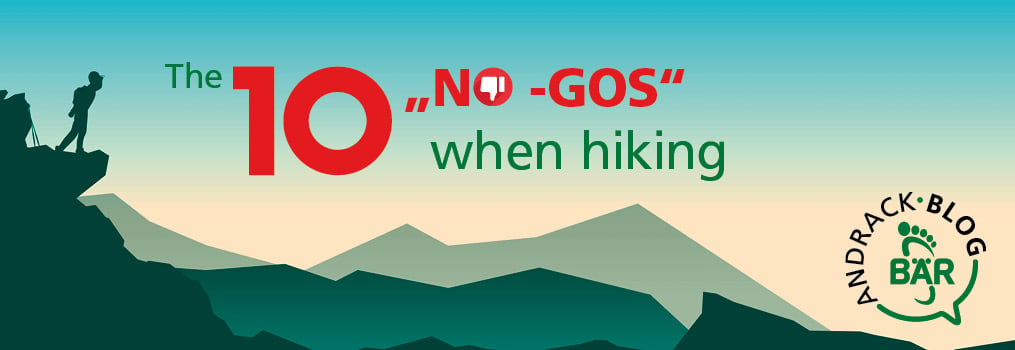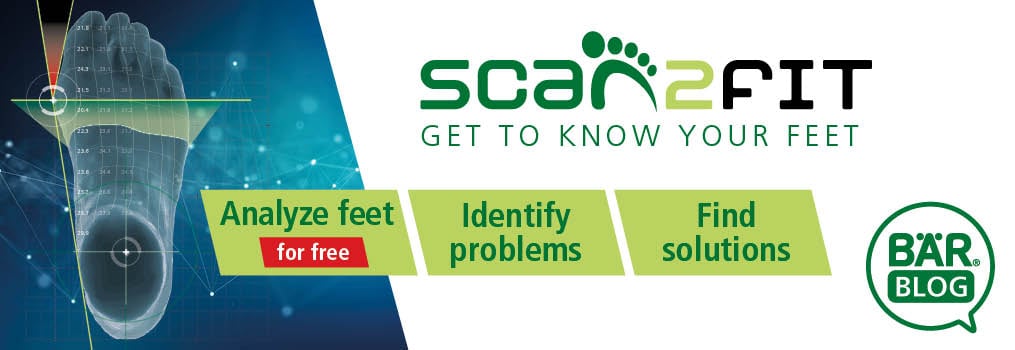INTERVIEW WITH MR. CHRISTOF BÄR ON THE SUBJECT OF "SUSTAINABILITY & MANUFACTURING"
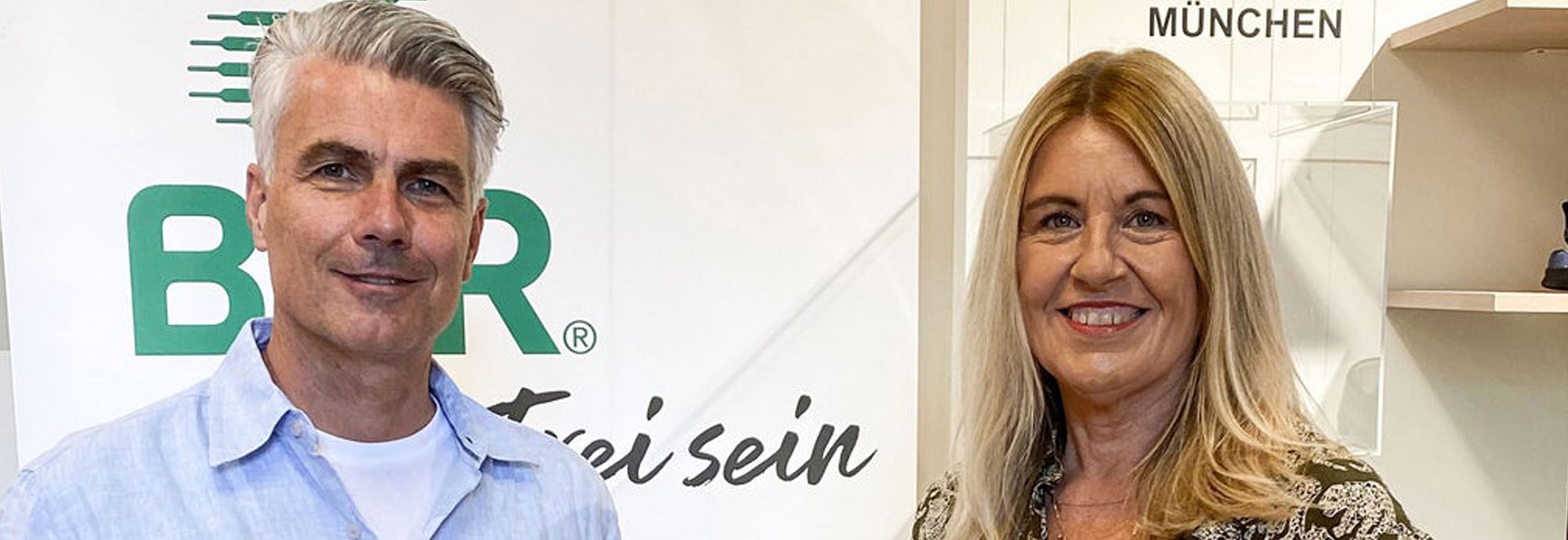
Dr. Claudia Schulz, also known as "Dr. Schuh", is a shoe expert, press spokesperson for the Federal Association of the Shoe and Leather Industry and the "German Shoe Institute", presenter, trend consultant, blogger and freelance journalist. Her mission: The shoe! Dr. Schulz asks Christof Bär, Managing Director of BÄR Manufaktur, a few questions about sustainability, the company idea, leather and many other aspects. Read the full interview here!
What does the company BÄR Schuhe stand for? What is the idea behind the brand?
Christof Bär: We grew up in the field of uncompromising toe freedom. My father (Christian Bär) traveled a lot for work at trade fairs, so he was on his feet a lot and came home in the evening with back pain, exhaustion and tiredness. He couldn't find any shoes in which he could walk without pain. He was looking for a shoe without a heel that offered his feet plenty of toe room. In principle, the walking sensation should be similar to walking barefoot with the added bonus of the necessary cushioning. As he couldn't find any shoes that met these requirements, and he was sure that many others could also live with these problems and benefit from the solution, my father ended up developing them himself and initially producing them on a contract basis. In Pirmasens, he found the right last know-how and started producing an initial 50 pairs of men's shoes in a small company in the Swabian Alb. Initially only in black, a second color and women's shoes were added later. Today, a collection contains 130 models, with 30% new developments per season. We were overwhelmed by the positive response. Yesterday, as today, our customers appreciate the exceptional, immediately noticeable comfort of Bär shoes: the so-called break-in period is not necessary with our shoes.
What makes a BÄR shoe so unique and how does it differ from other brands?
Today we are talking about sustainability.
Christof Bär: The basic idea of sustainability is first and foremost that a product should last a long time. The less I have to replace a product, the less waste I produce. One aspect of the complex issue of sustainability is to manufacture a product with a long service life. We follow this premise right from the start. Our motto is: long-lasting instead of short-lived. BÄR shoes last two to four times longer than conventional shoes.
This means that our collection is always designed to ensure that our durable shoes also meet fashion standards for longer than just one season. We also offer a three-year guarantee that goes beyond the legal requirements.
People often talk about "slow fashion" in this context - would you agree that BÄR shoes are long-lasting?
Christof Bär: Definitely - that's part of our philosophy. That's why the quality of our materials is so good that they can withstand long-term use - from leather linings and leather uppers to soles that can also be replaced as wearing parts.
Where are BÄR shoes produced?
Why in India?
Christof Bär: We started looking for alternatives early on in order to secure the manual labor required for our shoes. From the initial production of upper parts, the original joint venture in India then became our own subsidiary with the production of complete shoes. The decision to do this ourselves in India was due to the high quality standards and the availability of well-trained employees. You can only maintain this level and compliance if you have a direct influence on all processes. To this day, we find highly motivated employees who quickly integrate into the production process. Unfortunately, the profession of shoemaker is almost impossible to find in Germany and has become increasingly unattractive, with the result that it is almost no longer being trained. The shortage of skilled workers is also evident here.
Apart from that, we have been manufacturing in our own factory in India for 25 years, which we built from the ground up. This means that we have 100% influence on the conditions on site. In addition to safety, this also creates a high degree of flexibility so that we can also produce in small series. We source most of our materials from Europe, including leather from small tanneries in Germany and elk leather from Scandinavia. Only very few shoe manufacturers are able to process these very sophisticated and, above all, still very natural leathers with little finishing, such as deer, elk or mouflon leather. We still have shoe manufacturing facilities at our company headquarters in Bietigheim-Bissingen. In addition to the repair workshop, initial samples are produced here. This was and is a great advantage, especially in Corona times. In addition to the flexibility, it is a great opportunity for our employees to demonstrate their expertise. In this context, however, I must point out how difficult it is to recruit skilled workers for shoe production in Germany. Fortunately, we have a very good team in India with the right know-how. Many employees have been with us since the beginning and are learning every day in addition to their wealth of experience.
How do you implement sustainability in your factory in India? And how do you create transparency within the company as well as for the public and customers?
Christof Bär: First of all, I would like to emphasize the close connection between India and Bietigheim-Bissingen. There is no separation. The same values and rules apply here and there. BÄR Schuhe could be described as an international company with German roots. I am on site myself at least six times a year and always feel this affiliation, which is particularly important to me. Our current production building in India was inaugurated in 2012 - with the same workplace design standards as in Germany right from the start. The office design was also planned along the lines of our office in Bietigheim. The focus is on resource-conserving and energy-efficient processes. This applies, for example, to the production halls with environmentally friendly epoxy resin floors for dust prevention and hygiene. We have our own wastewater treatment plant and cover 50% of our energy requirements with photovoltaics. We are currently planning to install more panels to achieve an even higher rate. Our social standards are also of the highest level. Within the company, the Council of Representatives looks after the concerns of employees and works together to find solutions and communicate with the company management. We take responsibility for the people who work for us. Fair production and working conditions are a matter of course for us. Our employees are picked up from their homes and brought to the company in our own buses. Solar-controlled lamps donated by Baer India ensure greater safety on the public paths around the company. We are also involved in water treatment, for example we have donated water filters to a school for the deaf and dumb, which we support. Our compliance with standards and norms is regularly audited by independent institutions and certified according to ISO standards in the areas of social responsibility*, safety*, quality* and environmental management*. In the area of working conditions, I would even describe BÄR Schuhe as a pioneer in India. We do what is known as work-life balance: We offer our employees regeneration phases to loosen up with twice-daily guided gymnastics exercises to music or even healthy food such as fresh milk, which is rare and expensive in India, in the morning.
Regarding your question about transparency: We see it as our primary task to combat the poor image of shoe production in India, which is unfortunately often distorted by the media. We cannot change the world, but we can make a contribution within our means. As already mentioned, it is the close and direct cooperation that leads to a form of synchronization. For example, the Indian employees were here on site in exchange and vice versa the German employees in India. We carry out exciting project work with German students in India and vice versa, allowing them to take a look behind the scenes. What counts for us is the person behind the product. That is important!
*Explanation of the standards at the end of the interview.
What is your position on the Supply Chain Act?
Christof Bär: We have always done everything that is required there anyway. This has proven to be very useful, especially in times of coronavirus. Corresponding audits prove the transparency. On request, we can provide flawless tracking of the supply chain.
In addition, we have continued to pay all employees in India 100% during Corona. In Germany, too, we have almost completely avoided the loss of salary due to short-time working by reducing vacation and overtime. Even without the law, we feel responsible for the supply chain and our employees.
Sustainability also means social responsibility. You say: As a medium-sized company, the issue of employee responsibility is particularly important to you. What exactly does that mean?
Christof Bär: We take responsibility for our employees and their families in our Indian factory. This includes, for example, pension and health insurance.
And at the company headquarters in Bietigheim-Bissingen?
Christof Bär: Our aim is to employ and retain all employees in the company in the long term. We have 128 employees in Bietigheim-Bissingen, mainly in the areas of logistics and administration. We don't have any large departments and are very versatile and flexible. We work in a spirit of partnership. Everyone can stand in for each other if necessary.
Let's get back to the product. What materials are used to make Bär shoes? Where do the materials come from? (Resources)
Christof Bär: We mainly use leather because it is the material that most closely resembles human skin. This mainly concerns biomechanical aspects. Leather is characterized by breathability, flexibility and softness. Leather is also very stable and durable. Leather is therefore the number one material for us and cannot be replaced by anything else. We primarily use calfskin for the upper and lining. In contrast to many other shoe manufacturers, we deliberately use high-quality, untreated calfskin for the lining, so that the full breathability for the best foot climate is guaranteed for years to come. The leather we use complies with the strictest European guidelines. We work exclusively with controlled tanneries according to the LWG standard and know almost all our suppliers personally. I personally visit every tannery we want to work with. We also carry out regular tests and spot checks at independent institutes. Both in India and here on site.
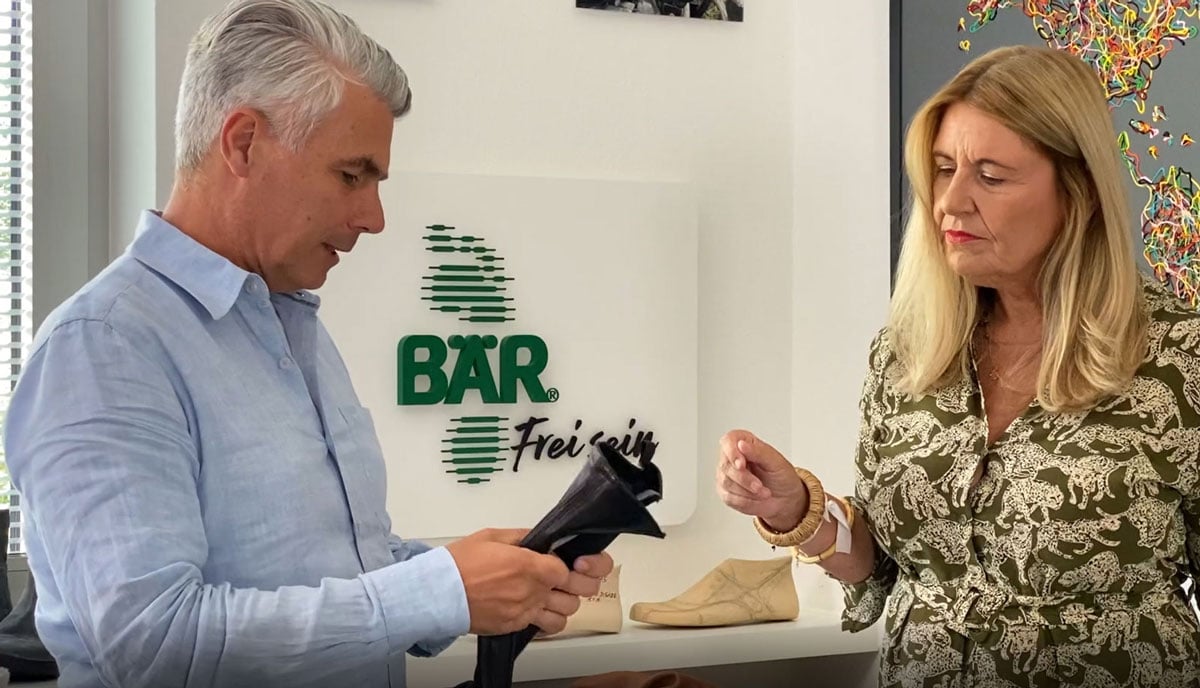
The topic of sneakers and light trekking shoes is currently a hot topic. Do you also see alternative materials from the high-tech sector that also have their advantages? Do you also process these?
Christof Bär: Yes, we already have some models in our range, such as shoes with uppers made from recycled PET bottles. We are responding to the increasing demand with this and with the further development of new materials.
Leather has been unfairly criticized. Why is leather a sustainable material?
Christof Bär: Leather is a high-quality and durable material. What many people don't know is that leather is a by-product of the meat industry and is therefore already in the upcycling process per se. No animal has to die for a shoe or a belt. It would actually be criminal not to use the leather - there are countries where this is handled differently and leather is burned and thus becomes a waste product. This is anything but sustainable. As already mentioned, it is characterized by breathability and durability. Leather is allowed to work and age. And if the leather shoe is really no longer wearable after resoling, then it can also be retired. Shoes that we dispose of as irreparable are often put to good use, where they may continue to be used.
Leather is a durable material if cared for properly. But shoes are made up of many components. Shoes wear out. How can I maintain a valuable shoe? (Warranty, repair service)
Christof Bär: We focus on preserving value. Starting with the product, which is made of high-quality, durable materials, through to shoe trees made of cedar wood, which help to absorb moisture from the shoe and smooth the leather again after wearing. We help customers to keep a BÄR shoe for a long time. That is why we also offer environmentally friendly care series and horsehair brushes, which can be used to work the care products into the pores of the leather. All this can double the life of a shoe.
As already mentioned, BÄR shoes come with a three-year guarantee. This is exceptional, but we have absolute confidence in our product. The BÄR repair service is also very popular. All BÄR shoes can be resoled and refurbished right down to the laces so that they are as good as new and can start their second life. We compare this to a general overhaul or the replacement of wearing parts, like tires in a car. This service is frequently used. Once you have bought a pair of BÄR favorite shoes, you can wear them for a long time. That too is sustainability.
And yet, as an entrepreneur, you are certainly interested in people buying a new pair of BÄR shoes from time to time. You are considered innovative. You manage the balancing act of combining fashion and comfort.
But: innovation, fashion and sustainability - do they go together?
Christof Bär: Short-term fashion and short-term sales are not part of our philosophy. We have confidence in our shoes and the BÄR brand and want to convey this confidence to our customers. Our promise is that our shoes are better than others. We cover all categories: from slippers to business shoes. We often meet customers who, after buying their first BÄR shoe, change their entire shoe wardrobe because they no longer want to do without comfort for any occasion. We are growing thanks to our loyal customers who are so convinced and enthusiastic about BÄR shoes that they recommend our brand to others. BÄR shoes are a way of life and not a passing trend product that satisfies for a few weeks on a whim. We have a real fan community. Beyond Germany, we are very strong in France, England, Austria and Switzerland. BÄR shoes are also very popular in Japan, and our shoes are in demand in Kuwait and many other countries. We also see potential in Scandinavia and Benelux.
On the subject of innovation: we are very keen to experiment with new soles, for example. This currently applies to sports shoes, which we are equipping with extra-light, abrasion-resistant soles made from PU/TPU compounds. We are also innovative in the socially relevant area of trekking/hiking. Here, for example, we combine high-quality high-tech materials with leather. As already mentioned, we use recycled materials made from PET bottles for our sneakers. Thanks to our many years of experience in the procurement market, we know which suppliers can implement our ideas.
On the subject of fashion: short-term, fast fashion trends are not our thing. We want our shoes to last for several seasons. This applies not least to our unique lasts, which offer 100% uncompromising toe freedom. We respond to the latest fashion trends with seasonal color and material themes, for example.
On the subject of sustainability: generational thinking is our guiding principle. We want to leave the world a better place than we found it. From raw materials to resources - we don't take anything away that could be missing in the future.
*Declaration of ISO standards:
Social responsibility (CSR), safety (OHSAS/ISO 18001), quality (ISO 9001:2015) and environmental management (ISO 14001:2015) certified.

